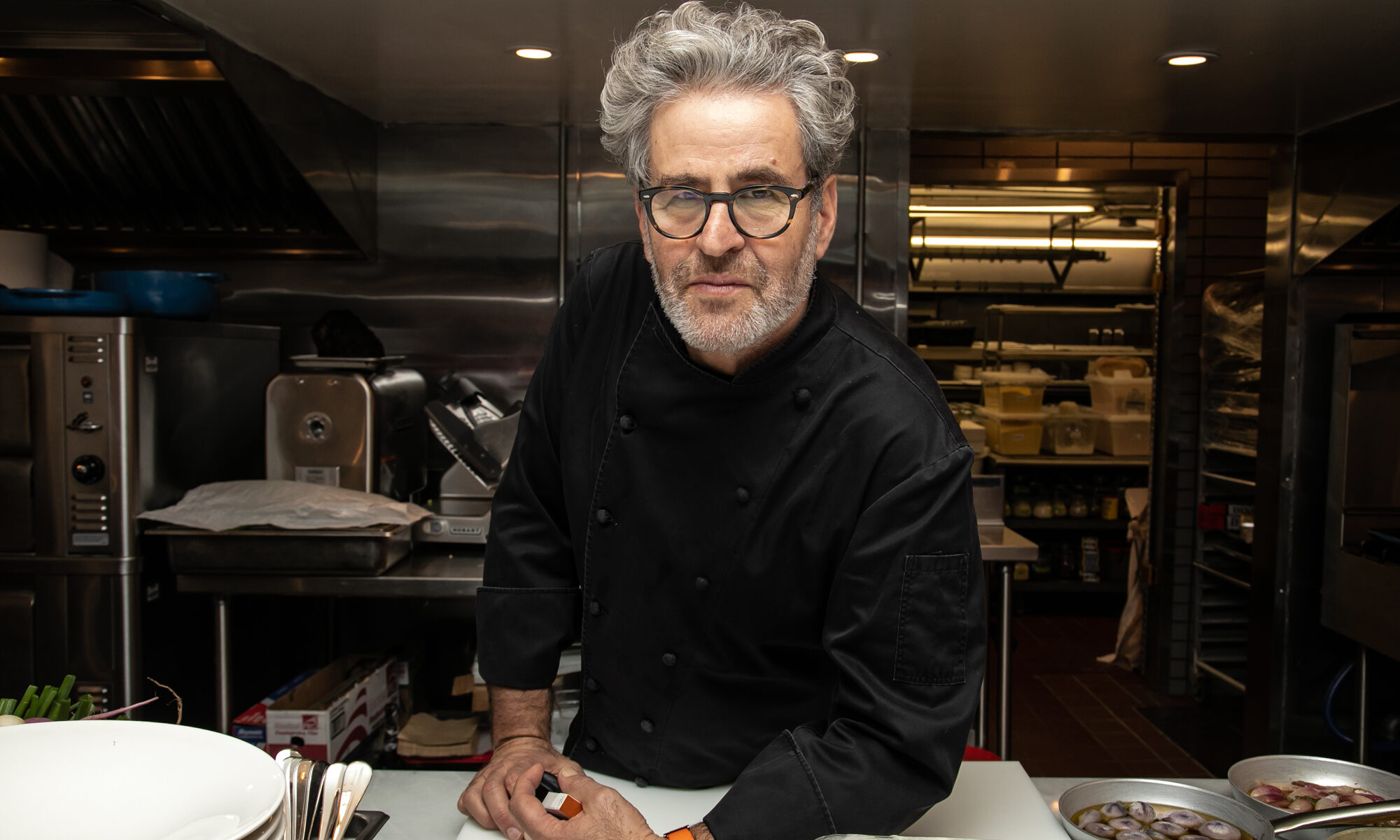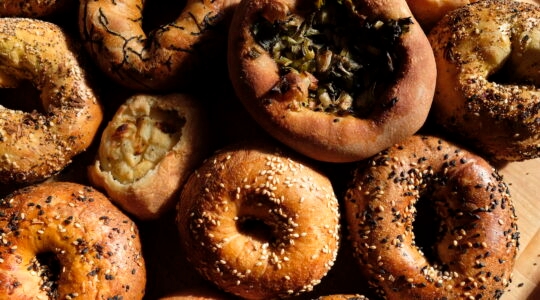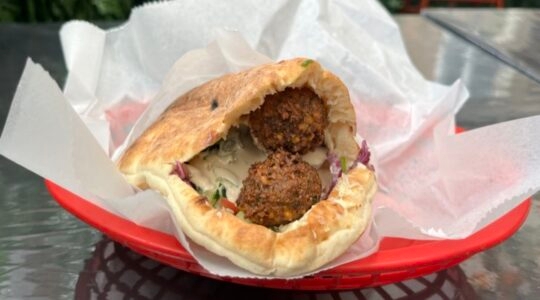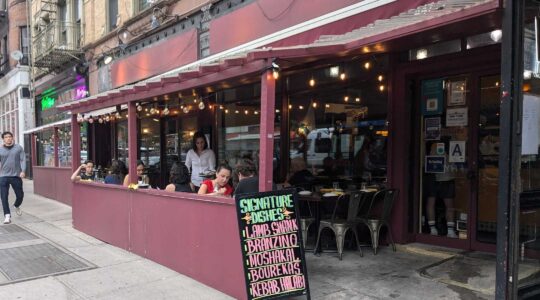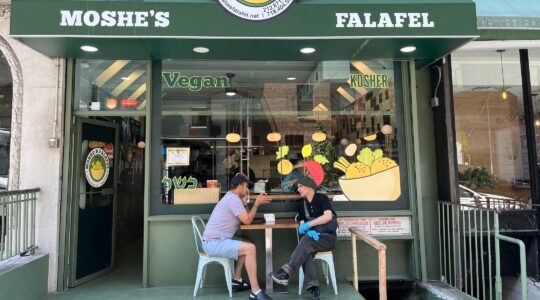(New York Jewish Week) — Israeli celebrity chef Eyal Shani, who currently boasts 40 restaurants worldwide, became a sensation on these shores when he opened Miznon in 2018 at Chelsea Market. There, he introduced New Yorkers to a new style of Mediterranean street food that eclipsed the usual falafel, hummus and shawarma offerings. Locals and tourists alike lined up to devour Shani’s smashed potatoes, inventive pita creations and now-iconic whole roasted cauliflower heads.
Last May, Shani opened the latest addition to his NYC restaurant group: The aptly named Shmoné, which is located on West Eighth St. — “shmoné” is eight in Hebrew. The restaurant’s fresh approach — it features a new menu daily — landed Shani in the Michelin guide for the first time ever earlier this year, nominated for coveted star status. According to Michelin, “this small, sleek space punches way above its weight with dazzling Neo-Levantine cuisine.”
“I’m very, very happy for that, [but] I’m not focusing on getting Michelin stars,” Shani told the New York Jewish Week.
In fact, though he takes pride in all his restaurants — and voices enthusiasm for every culinary feat — Shani doesn’t believe Shmoné is “his most creative spot.” And yet, he said Shmoné is a very personal place to him, one of his most beloved restaurants. Ever the raconteur, he spoke about the energy that he puts into his food there and the harmony that results. “You need the magic,” he said. “I cannot explain it.”
As with all his restaurants, Shmoné has an open kitchen, which allows diners to observe the “food choreography,” as he called it. “I’m not cooking without a precise address,” he said. “I will cook for you when I see you. I am cooking for your eyes. If I cannot see you, I’m not cooking for you.”
Local sourcing and farm-fresh ingredients play a key role, too — something that Shani sees as very Israeli. “[Our ancestors] used to eat very pure, very close to the earth,” he said. “When you serve pure food to people it reminds them of something that’s exciting them.” The staff at Shmoné comb the Union Square Greenmarket for fresh produce, while their chicken is sourced from a small farm in Pennsylvania.
Shmoné’s menu is divided into categories by “creature” — though Shani utilizes an unconventionally broad definition of the word, including not only animal life but produce, breads and desserts. A “wheat creature” could be focaccia with sour cream; an “earth creature” could be tomato ovaries and green chili or a “stretchy stracciatella lasagna” served in a pyrex tray. Shani’s distinctive sense of humor is evident throughout the menu; for example, Shmoné previously served a dish called “I think I’ve managed to make a better mashed potato than [renowned French Chef Joel] Robuchon and it’s vegan.”

Like Shani’s other restaurants, Shmoné has an open kitchen and focuses on fresh produce. (Max Flatow)
Shani, 64, was born in Jerusalem and now lives in Tel Aviv. A self-trained chef who had studied cinematography, he cited a few inspirations for his career, though a major one was his vegan grandfather, who lived upstairs. Shani’s grandfather served him raw food, juices and salads and, in taking Shani to vineyards and markets, taught him to appreciate the purity of vegetables and fruit.
After his army service, Shani traveled for two years in Europe. But when a girl broke his heart, he returned to Israel and lived on a friend’s farm in the north. It was there that he decided to become a chef. “I lived there for a year like a priest — I ate from the fields and drank the water that I took from the ground,” he said. “One day, there were some hunters who were my friends and they came to bring me four porcupines. I lit the fire and ate [them], drank two bottles of wine and fell asleep in the middle of the field. I woke up in the morning and decided that all I wanted to do was cook.”
After painting houses for a while, Shani got a job in 1988 at Hotel HaSharon’s restaurant in the Herzylia Pituah neighborhood of Tel Aviv. He admitted he did not know how to cook but promised to work hard. Once he advanced to sous chef, the future restaurateur could be found racing to the parking lot to refer to the Julia Child cookbook he had tucked away in his car.
In 1989, Shani opened his first restaurant, Oceanus, in Jerusalem. A small, 24-seat space, it offered bouillabaisse, focaccia, fish and salad, and it was there that Shani began to really hone his skills. It closed after 11 years and was followed by Ocean in Tel Aviv, open for two years. Then, in 2008 he and his partner, Shahar Segal, opened the trendy, high-end HaSalon in Tel Aviv, serving up modern takes on Israeli cuisine with some Italian influences. This was the start of his restaurant empire in Israel; soon HaSalon was followed by the casual Miznon and seven others.
After he established himself solidly as a force in Israel, Shani expanded the Miznon chain to Paris in 2013, then Vienna in 2016, followed by Singapore, Melbourne and, eventually, New York, where Shani said he was seduced by the city’s exciting, vast and diverse food scene, calling it “the essence of American culture.”
Support the New York Jewish Week
Our nonprofit newsroom depends on readers like you. Make a donation now to support independent Jewish journalism in New York.
At the same time, Shani said he feels challenged to upend New Yorkers’ culinary expectations. “When they are putting walls around me it’s seducing me, it’s seducing me to break them,” he said. “It’s my nature.”
https://www.instagram.com/p/Cox9VcYv9kn/
From that first Miznon outpost at Chelsea Market, Shani expanded to eight restaurants across Manhattan, including a two-story Miznon North sit-down restaurant on the Upper West Side in 2019. (One Miznon branch has since closed.) That same year he opened HaSalon on Tenth Ave., where he serves dishes like “Hell’s Chicken” (a play on the neighborhood, Hell’s Kitchen), and a hand-rolled 12-foot pici pasta noodle, inspired by the notion that everything in New York is big and presented on a large scale.
Shani opened Naked Tomato, a skewer restaurant with generous salad accompaniments, in Hudson Yards during the pandemic. There, he became notorious for serving a single tomato on a plate for $24, inspired by a “perfect tomato” that he came across in an upstate New York greenhouse. “If a dish is a sentence, my culinary sentence is one word and that is the subject,” he said. “If I’m doing something with tomato, it will only be tomato: no sauces to warp it, cover it or mask it. You have to serve it completely naked. You are standing completely naked in front of your plate, in front of your audience.”
Shani explained that, with each new restaurant he opens, he visits each location and tries “to get some signals.”
“I can feel the environment, I see my team, I’m looking at the architecture, absorbing the atmosphere, the energy, the vibe of the place,” he told the New York Jewish Week. “It’s like a new ingredient coming to me and something inside myself assembling [assembles] them into the shape of a new restaurant.”
Shani says he immerses himself fully into the process of opening a new place. “I’m there and all the outer world disappears, all the noises are cut and I’m completely focused on one thing, and that is the only thing that exists in my life.”
And the new places keep coming: Since 2021, Shani has opened restaurants in Toronto, London, Miami and Boston, and, most recently, Dubai. Currently in the works are expansions to Amsterdam, Mexico City, Barcelona and Zurich, and two more New York eateries are also coming soon: a Miznon outpost uptown at 2895 Broadway, near Columbia University, as well as a “gastro bar” called Port Said, which is slated to open at 350 Hudson St. this summer.
“When you are establishing a restaurant you cannot change it anymore — it’s got its own character,” he said. “Because I’m changing all the time, I’m opening restaurants all the time.”
As for the recent Michelin nod, even though it was for a New York-based restaurant, Shani said it was “one of the most wonderful things that can happen for Israel,” as it will continue to enhance the country’s reputation as a culinary destination.
“Israeli cuisine started 70 years ago — it began without roots in any tradition,” he said. “Nothing is shaping them besides their ideas and imagination. Israelis are importing ideas and then shaping them in their own way, and that makes the cuisine so special.”
Shani is not shy about the impact he has made when it comes to introducing Israeli food to the world. “I’m the godfather of Israeli cuisine,” he said. “The main structure of Israeli food was built by me.”
Support the New York Jewish Week
Our nonprofit newsroom depends on readers like you. Make a donation now to support independent Jewish journalism in New York.
Ultimately, no matter the price point or location of his various restaurants, Shani believes his food brings people joy. “I think it’s about giving happiness to people, he said. “That is my cuisine.”
